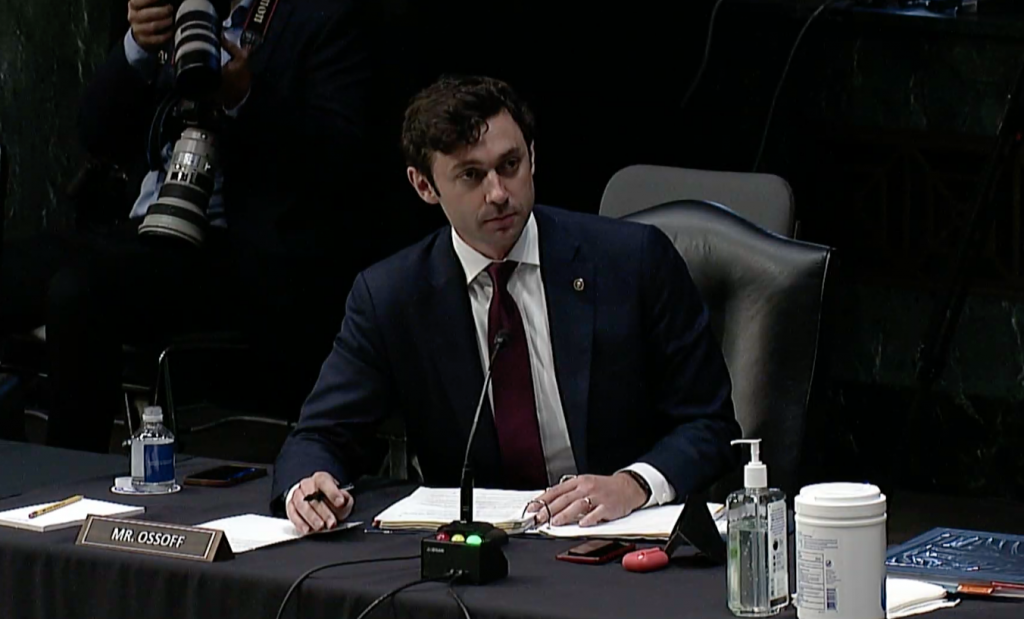Garland committed to swiftly implement Sen. Ossoff’s bipartisan prison reform bill if signed into law
Washington, D.C. –– U.S. Senator Jon Ossoff is pressing forward on his efforts to reduce violence and civil rights abuses in America’s prisons.
Today in a U.S. Senate Judiciary Committee oversight hearing, Attorney General Merrick Garland signaled support for Sen. Ossoff’s efforts to pass his bipartisan Prison Camera Reform Act, which passed the Senate last week.
“Last week, the Senate passed legislation that I introduced alongside Chair Durbin and Ranking Member Grassley — the Prison Camera Reform Act — to reduce violence and civil rights abuses in BOP facilities by overhauling a security camera system that IG Horowitz has found is outdated, unreliable, as well as the means of preserving and recording the footage from those systems,” Sen. Ossoff said.
AG Garland agreed to a swift implementation of Sen. Ossoff’s bipartisan Prison Camera Reform Act should it be signed into law.
Sen. Ossoff also raised the issues of staffing shortages in Federal prisons and an inconsistent policy for the use of solitary confinement in Federal Bureau of Prisons facilities.
AG Garland committed to Sen. Ossoff that the Justice Department would work with him to address concerns regarding staffing shortages and solitary confinement.
Click here to watch Sen. Ossoff’s line of questioning:

Please find a transcript of the exchange below:
SEN. OSSOFF: “Thank you, Mr. Chairman. Attorney General, nice to see you, thank you for joining us. Last week the Senate passed legislation that I introduced alongside Chair Durbin and Ranking Member Grassley –– the Prison Camera Reform Act –– to reduce violence and civil rights abuses in BOP facilities by overhauling a security camera system that IG Horowitz has found is outdated, unreliable, as well as the means of preserving and recording the footage from those systems. Do you agree that these reforms are necessary, and should this bill become law, will you commit to prioritizing the implementation of the requirements it imposes upon the BOP?”
AG GARLAND: “Yes, and yes.”
SEN. OSSOFF: “Thank you, Attorney General. I’d like to discuss with you staffing issues at the Bureau of Prisons. Earlier this year, the GAO, which as you know is a nonpartisan independent watchdog, concluded that BOP lacks a reliable method for assessing the scope of staffing issues or the impact on incarcerated populations and staff of staffing issues at BOP facilities. Do you agree the inability to reliably measure this problem impedes BOP’s ability to address gaps, for example, shortages of medical staff, shortages of personnel who will help implement the First Step Act and anti-recidivism programs, as well as makes it more difficult for Congress to respond? And will you commit to working with my office to help identify where there’s gaps in planning or budgeting or personnel management or the authorities that BOP has?”
AG GARLAND: “Yes, Senator, I met with the Comptroller General about this, about various of his reports and this one, in particular. And I agree this is a serious problem with the Bureau of Prisons. The Deputy Attorney General has been working on this problem for quite some time now. As she has repeat meetings with the Bureau of Prisons to go over this issue with respect to staffing and assessment. And I’d be happy to have somebody on our staff meet with your staff.”
SEN. OSSOFF: “Thank you, Attorney General. The Inspector General has determined that BOP lacks a clear and consistent policy for the use of solitary confinement in BOP facilities. Has BOP, to your knowledge, issued such a policy?”
AG GARLAND: “I don’t know the answer to that.”
SEN. OSSOFF: “Okay. Will you work with my office to determine whether they have and what may need to be done to ensure that they do?”
AG GARLAND: “Of course.”
# # #